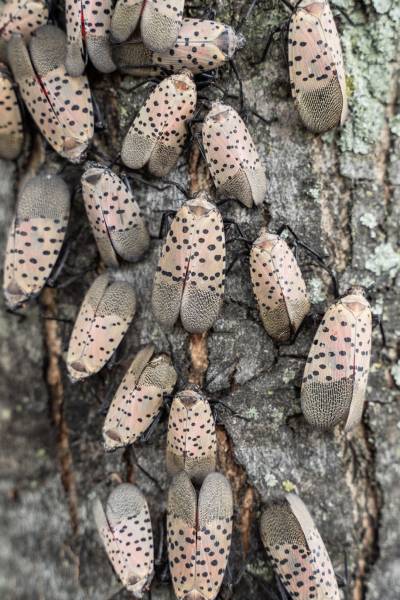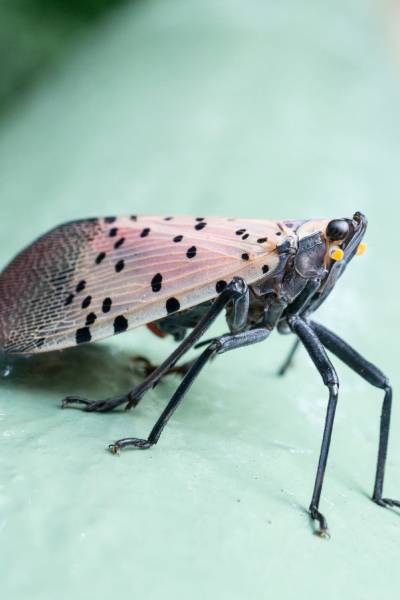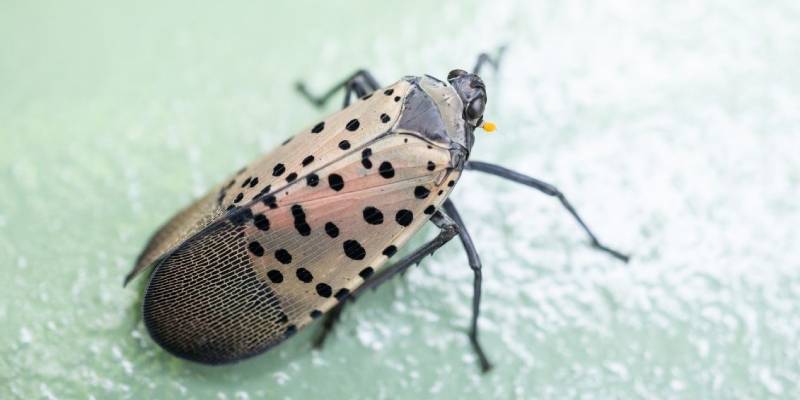In June 2022, the invasive Spotted Lanternfly was discovered in North Carolina. Help us stop them! We all need to work together to stop the spread. This non-native species from China, India and Vietnam was first found in Pennsylvania in 2014 and continues to expand across the country.
Invasive insects increase their population quickly and spread because of a lack of natural predators. Here’s what Charlotte homeowners need to know about this unwanted pest.
What Do Spotted Lanternflies Look Like?
Young nymphs are black with white spots on their legs and body. As they grow, red patches appear on their bodies.
At the adult phase, people often confuse the Spotted Lanternfly with several local species of moth. When resting, its wings appear beige or gray with black spots.
When the wings extend for flight, you see vivid red hind-wings that characterize this insect.
An adult Spotted Lanternfly is up to an inch long and half an inch wide.


Is the Spotted Lanternfly Dangerous to Humans?
The Spotted Lanternfly doesn’t bite or sting people or pets. So why are we worried about them?
According to the North Carolina Extension Office, this insect does significant damage to crops and trees and has no natural predators in the area. A recent study found there were over $300 million in crop losses in Pennsylvania alone last year.
Other studies reveal homeowners spending thousands of dollars to eradicate Spotted Lanternflies on their property and clean up the mess they leave behind.
What Do They Eat?
The Spotted Lanternfly’s favorite food is the equally invasive tree-of-heaven. They also love grape vines, hops, and fruit trees like apple, plum, cherry, peach and apricot. These insects feed on our beloved ornamental and shade trees like sycamore, beech, black walnut, dogwood, oak, and maple, too.
Although the Spotted Lanternfly doesn’t kill the host trees, these trees wilt and ooze sap. This damage makes the trees susceptible to disease and other killing pests. Fruit trees and vines with Spotted Lanternflies see significant drops in fruit yield, such as up to 90% less fruit on grapevines after infestation.
More than a Nuisance Insect on Your Property
The Spotted Lanternfly may seem nothing more than a nuisance to most people. But they create quite a mess.
Spotted Lanternflies congregate in large numbers. During and after feeding, these insects secrete honeydew, a sticky substance that, for lack of a better term, is the insect’s poop. This sticky honeydew falls on leaves, patios, decks, cars – any surface these insects land on or fly over.
Then, as if the sticky honeydew-poop wasn’t bad enough, a fungus called sooty mold grows on the excrement. It's very difficult to clean up.
Entomologists and homeowners agree... prevention of Spotted Lanternflies invasions is better than trying to clean up after them and exterminate them.
What Can You Do to Stop the Spotted Lanternfly?
1. Report it!
Even if you think you see a single Spotted Lanternfly in your yard, call the hotline. The North Carolina Department of Agriculture and Consumer Services manages an online database to make reporting sightings easy. Don’t wait!
NCDA: Spotted Lanternfly Reporting Website
2. Avoid Hitchhikers
Spotted Lanternflies hitched a ride on materials brought to the U.S. They can also hitch a ride on your car, in your camping gear, on firewood, etc. Be sure to check for eggs, nymphs and adult lanternflies if you are moving materials from an infected area.
3. Get Pest Control Services
Routine pest control is an important way to stop small problems before they become large ones. Regular services break the reproductive cycle of many pests. Croach® technicians specifically look for signs of dangerous or invasive species.
Call Croach® for a free estimate, protect your property, and help us stop the spread of Spotted Lanternflies in the Charlotte area.
We serve communities in the Piedmont including Belmont, Charlotte, Concord, Davidson, Gastonia, Harrisburg, Huntersville, Kannapolis, Lowesville, Matthews, Mint Hill, Monroe, and Mooresville.


